Our most recent Tiered Access update introduced the ICANN Community’s pilot project for a central intake point for registration data disclosure requests. Now called the Registration Data Request Service (RDRS), this pilot is intended to help gather volume data to inform the ICANN Board’s decision about building a permanent, more feature-rich centralized data request system.
The project is progressing, with a Cross-Community Working Group to determine requirements and success criteria for the system. ICANN has also been consulting registrars to understand what registrars expect from the service and how to maximize registrar engagement.
Tucows will continue to use our TACO platform to manage the disclosure process while also partnering with ICANN on this project. We will review requests submitted via the RDRS and, if it is determined that data should be disclosed, will disclose it to the requestor via the TACO platform, just as we do today.
We want to stress that submitting a request through the RDRS does not mean it will automatically be approved; we still have a meaningful human review process that balances the requestor’s legitimate interest against the domain owner’s right to privacy. This will continue to apply to all disclosure requests submitted to us—indeed, the RDRS was never intended to replace this meaningful human review.
Additionally, we still will only reveal underlying data for domains protected by our Contact Privacy service in response to adequate due process (or otherwise in accordance with our terms of service). This has been our policy since the beginning, and will not change as we participate in the RDRS pilot project.
None of this will pose a problem for the RDRS pilot. The purpose of the RDRS is to gather usage volume so the Board can make a data-driven decision about whether to build an expanded access and disclosure system. We strongly believe in the multistakeholder model of Internet governance represented by ICANN. Contributing to this data-gathering effort is a meaningful way to demonstrate our support.
On another note, we’ve added something new to our TACO stats reporting: the number of requests where the registration data is already publicly available. This is an increasingly frequent outcome of disclosure requests, though we only started documenting it fairly recently. We expect RDRS to report on this type of request outcome as well and look forward to seeing how our rates compare. It is sometimes the case that a requestor either does not perform their own lookup prior to submitting a disclosure request or does not understand the output. We encourage all users to review publicly-available data before going through the request process and will continue to educate TACO users.
And now, let’s review the Tiered Access (TACO) platform statistics for the first part of 2023.
Tiered Access statistics, January – April 2023
We received 135 requests in the new period; the total number of Tiered Access disclosure requests received since we began tracking in January 2018 is now 5,286.
Below you’ll find the outcome of these requests and how that has changed over time, starting with our new period (1 January to 30 April 2023).
Data disclosure request outcomes: New Period (January – April 2023)
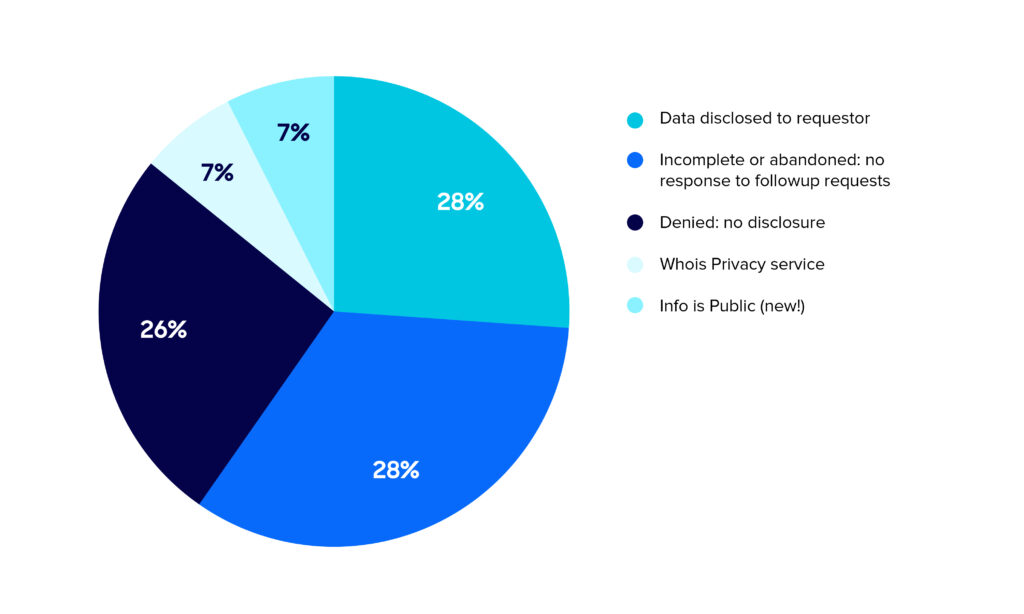
Readers will note that there is a new category here: for domains where the registration data is already public (using our “Whois Publicity” service or registered at a registry that requires public whois data) and thus does not need to be requested via TACO. This is separate from domains protected by our Whois Contact Privacy service, which continue to be tracked as their own category.
Request outcomes, compared:
This was a bit of an odd period, as we received a significant increase in the number of requests for domains that are not registered with a Tucows family registrar.
The disclosure and abandon rates both dropped, while denials jumped from 6% last period to 26% this period. Of those denied requests, 80% were for domains that are not registered with us at all; the denial was not because of the requestor’s lack of legal basis for access but rather because we don’t hold the data in the first place. That leaves only 7 requests actually denied, or about 5% of total, bringing us back to the normal rate of denials.
As we mentioned above, we’ve added a new chart below tracking requests where the data is already public. Looking back at our last reporting period (September – December 2022), only 1% of requests fell under this category while, in the new period (January – April 2023), requests for domains with already-public data made up 7% of all the disclosure requests submitted to us.
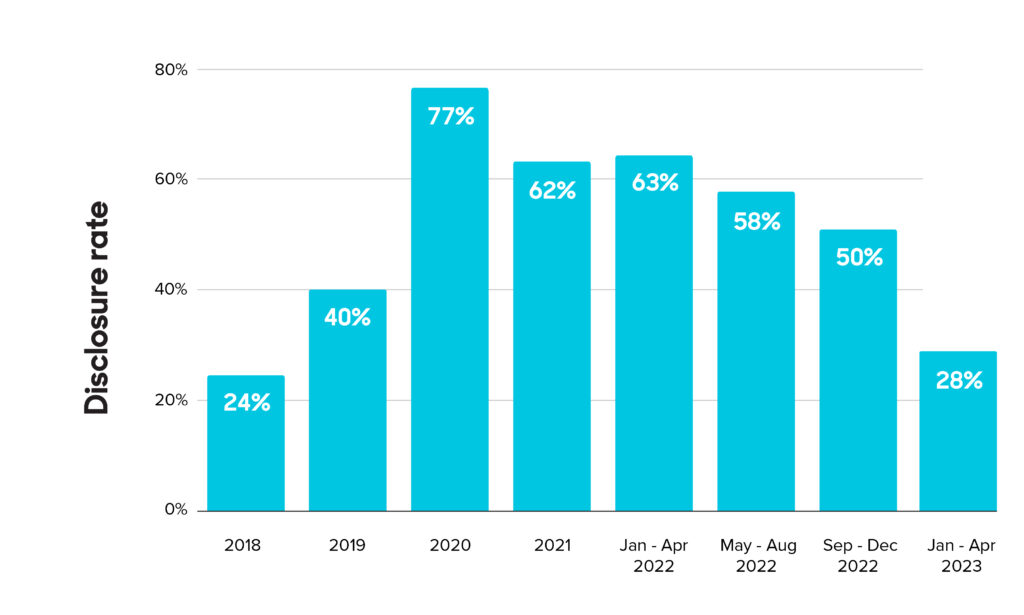
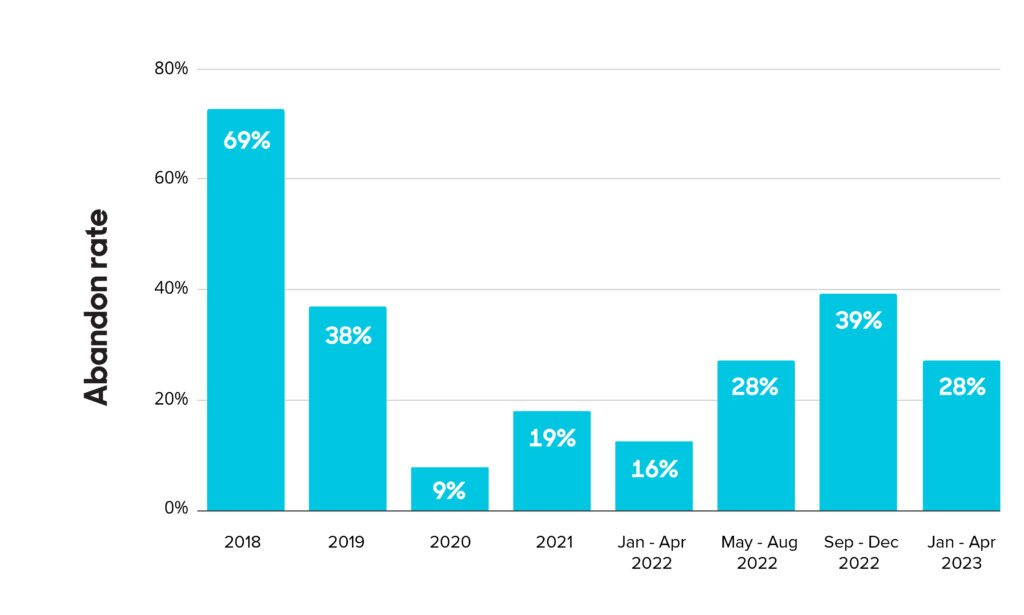
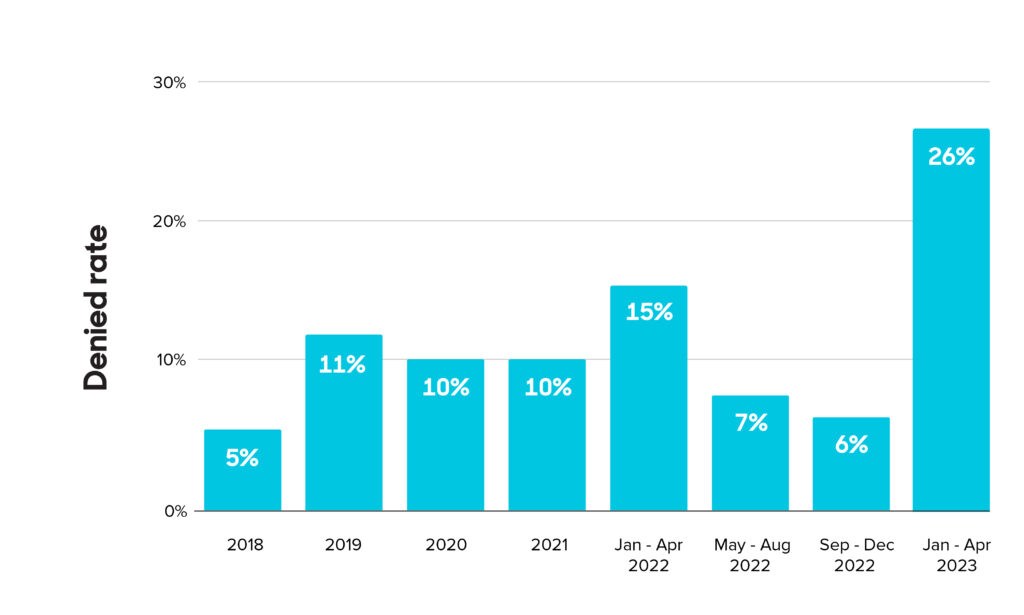
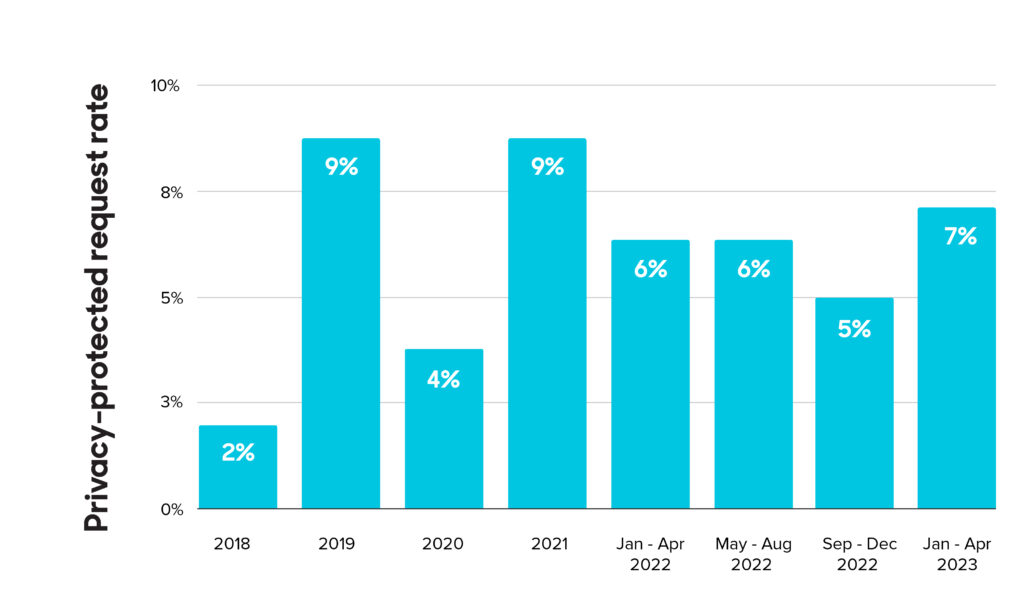
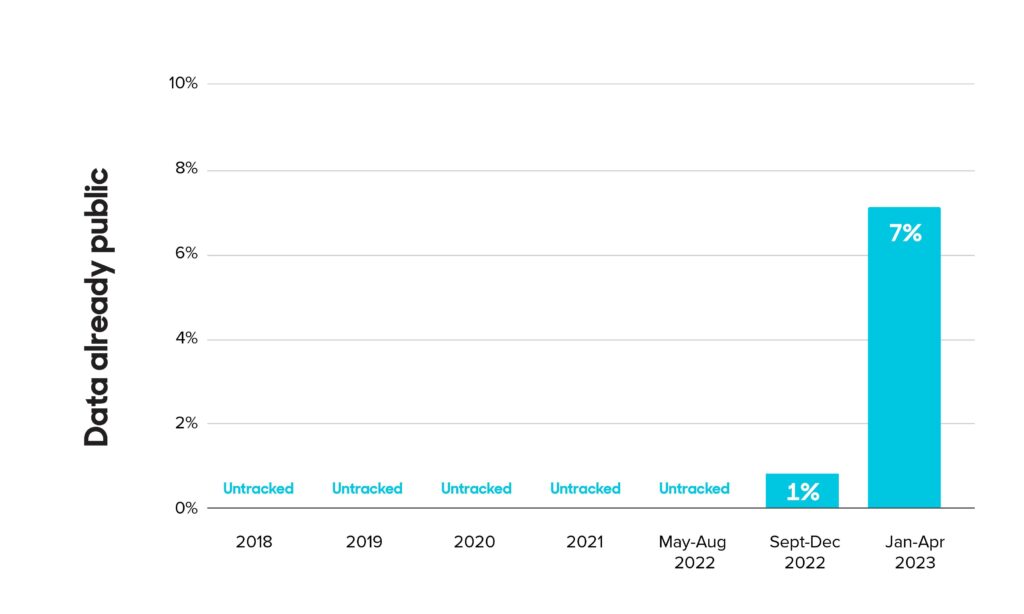
Remember, we began tracking this category in May 2022, and it remained so low that it didn’t fit into our reporting until this most recent reporting period.
Requests by requestor category
So far in 2023, requests from Law Enforcement and Commercial Litigation interests have been almost evenly distributed. We have received a total of three requests this year from security researchers; they are included in the five total requests we have received for full access to our unmasked Whois database (the other two were from law enforcement). Since we require that there be a legitimate interest to view the previously-public registration data of every domain, requests for bulk access to the entire database are unlikely to be approved—but we do still review the requests.
This is a great excuse to remind readers that access to previously-public registration data is not necessary to contact the registrant! Our Whois and Registration Data Access Protocol (RDAP) pages always include a URL in the “Registrant Email” field for a form that allows you to send a message directly to the domain name registrant.
Requests by category: new period (January – April 2023)
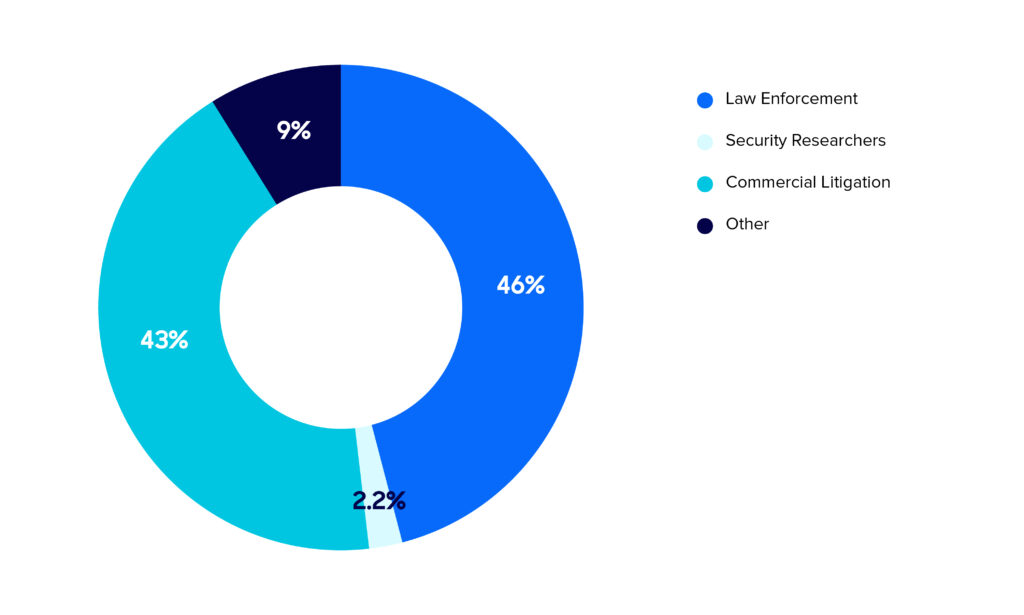
Requests by category since 2018
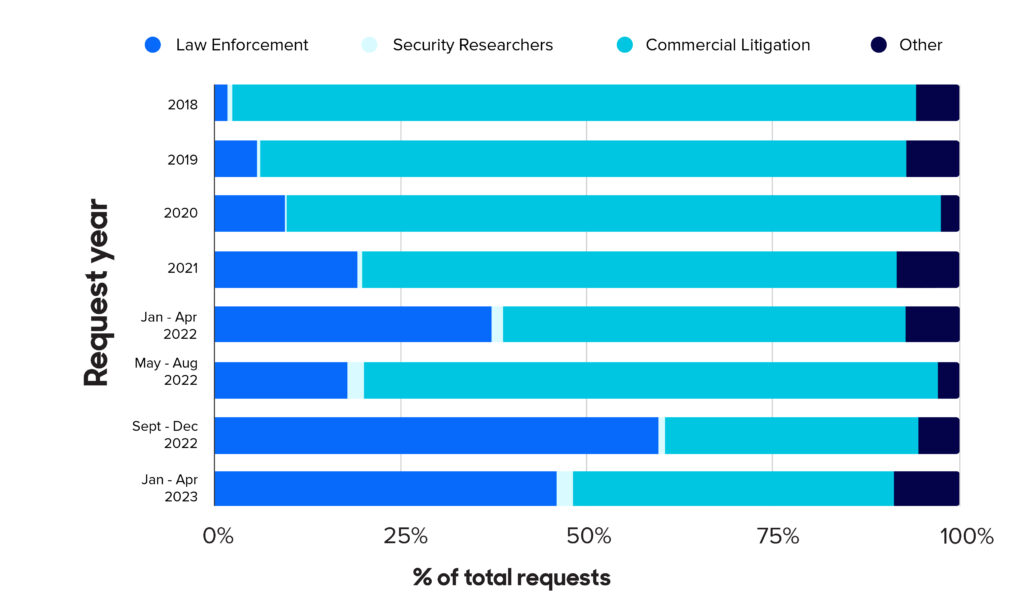
Requests by category (total)
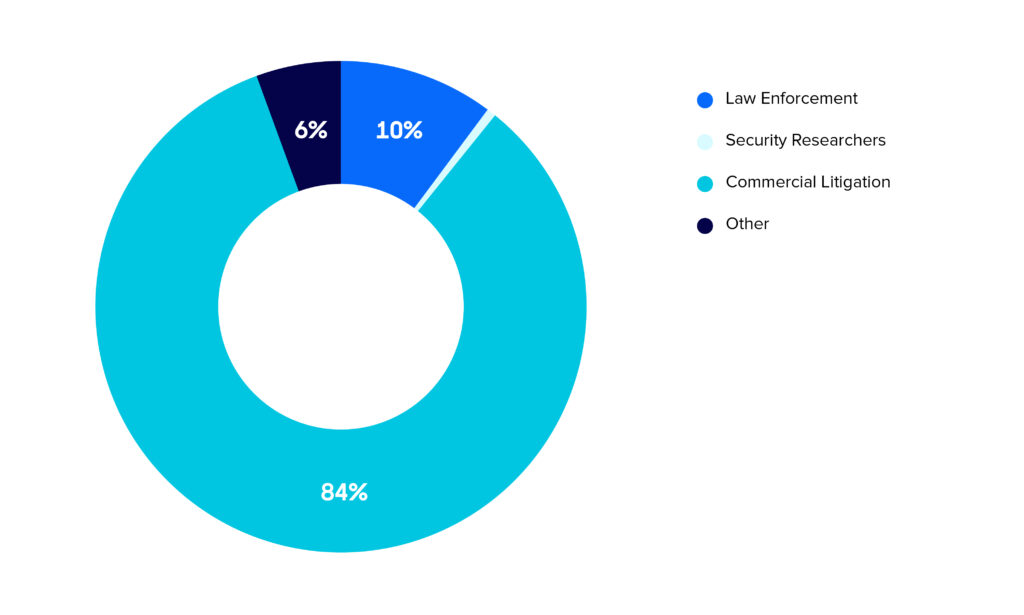
Abandoned requests by requestor category (January – April 2023)
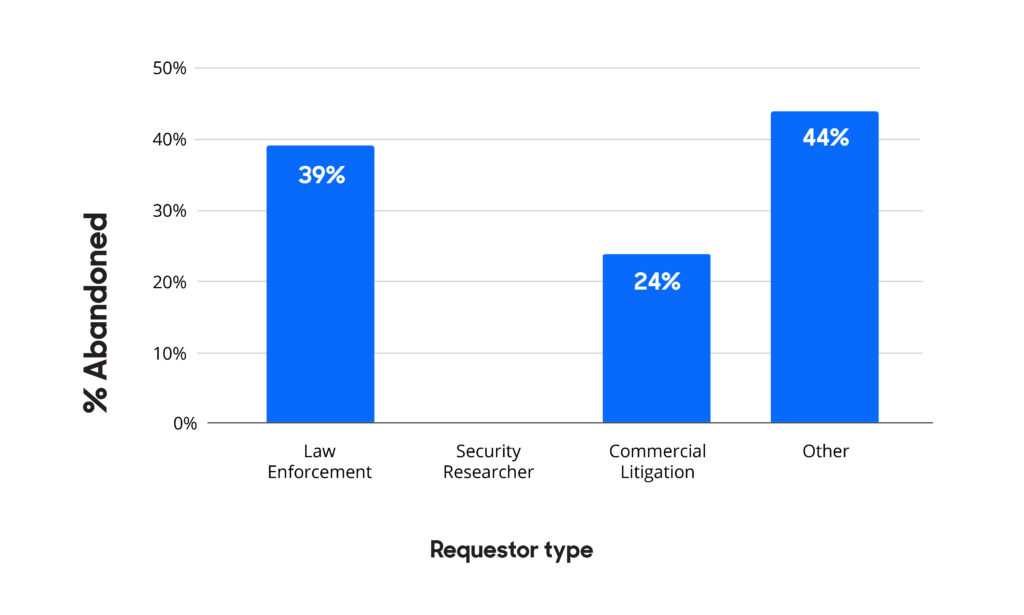
Total requests over time
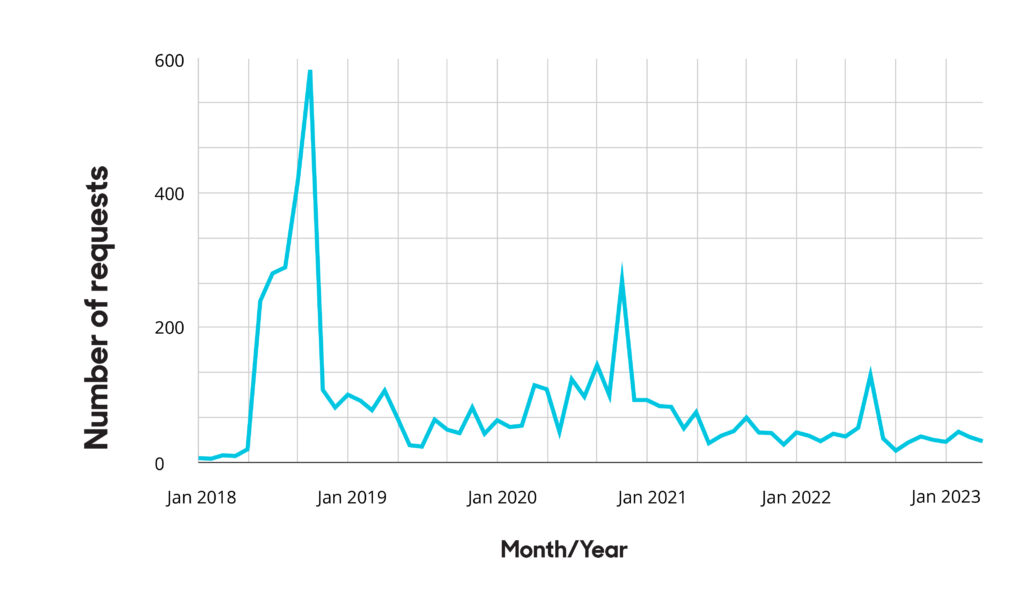
Finally, we can look at the total number of requests received over just about five years of operating our TACO platform. The monthly rate still shows spikes every so often, though never as much as we saw in 2018.
We hope that this information continues to be informative and look forward to seeing our ICANN community colleagues at ICANN 77!
To read our past Tiered Access blog posts, please see:
- OpenSRS’ Tiered Access Directory: a Look at the Numbers (May 2018 – mid-February 2019)
- Tiered Access Data Disclosure Update (mid-February – mid-October 2019)
- Privacy and Lawful Access to Personal Data at Tucows (mid-October 2019 – end of February 2020)
- Whois History and Updated Tiered Access Statistics (March – end of August 2020)
- Tiered Access request review process and updated statistics (September 2020 – end of August 2021)
- Tiered Access update: refreshed statistics and law enforcement processes (August – December 2021)
- Tiered Access update: registration data accuracy and updated statistics (January – April 2022)
- Tiered Access update and thoughts on due process (May – August 2022)
- TACO Platform Updates
- Tiered Access update: policy check-in and updated statistics (September – December 2022)
